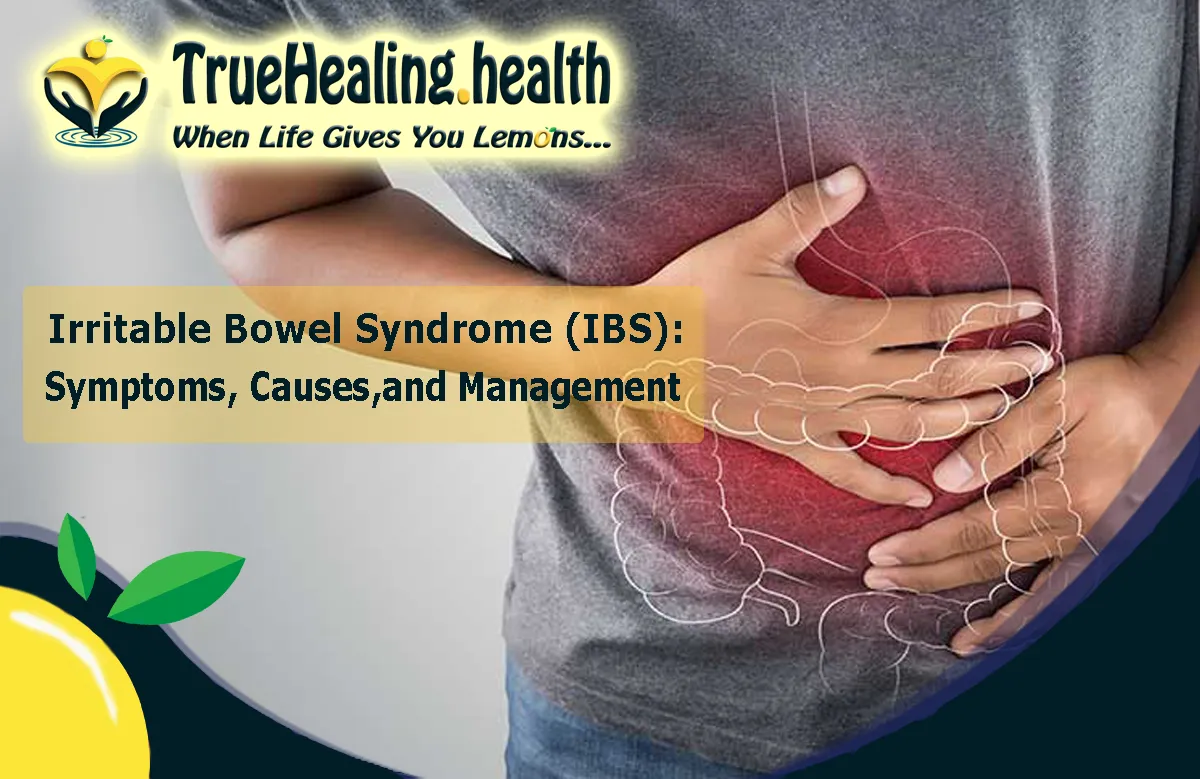Understanding Irritable Bowel Syndrome (IBS): Symptoms, Causes, and Management
Irritable Bowel Syndrome (IBS) is a common gastrointestinal disorder, an inflammatory bowel disease, that affects millions of people worldwide. It is characterized by a range of symptoms, including abdominal pain, bloating, and changes in bowel habits. This comprehensive guide will delve into the symptoms, causes, and management of IBS, providing valuable insights and practical tips to better understand and cope with this condition.
Why Read This Article:
- Gain a thorough understanding of the symptoms associated with IBS
- Patients with irritable bowel syndrome can explore the underlying causes and triggers of IBS
- Discover effective management strategies and lifestyle modifications
- Patients with IBS can learn about the latest research and treatment options for IBS
- Empower yourself with the knowledge to improve your quality of life.

II. Understanding Irritable Bowel Syndrome (IBS)
A. Definition and Overview
Irritable Bowel Syndrome (IBS) is a chronic functional bowel disorder that affects the large intestine (colon) and causes a variety of gastrointestinal symptoms. It is a complex condition characterized by a collection of symptoms rather than a specific disease process. IBS is considered a functional disorder because it affects the way the bowel functions without causing any structural abnormalities or damage to the digestive tract.
B. Prevalence and Impact
IBS is a common condition, with estimates suggesting that it affects approximately 10-15% of adults in the United States. However, it is important to note that many cases of IBS go undiagnosed, and the actual prevalence may be higher. IBS can have a significant impact on a person's quality of life, leading to physical discomfort, emotional distress, and limitations in daily activities.
C. Types of IBS
There are three main types of IBS, based on the predominant bowel habit:
- IBS with constipation (IBS-C): This type is characterized by infrequent bowel movements and the presence of hard, lumpy stools.
- IBS with diarrhea (IBS-D): This type is characterized by frequent bowel movements and loose, watery stools.
- IBS with mixed bowel habits (IBS-M): This type involves a combination of both constipation and diarrhea, with alternating episodes of each.
III. Symptoms of Irritable Bowel Syndrome (IBS)
A. Abdominal Pain and Discomfort
One of the hallmark symptoms of IBS is abdominal pain or discomfort. This pain is often described as cramping or aching, typically in the lower abdomen. The intensity and duration of the pain can vary from person to person and may be relieved by passing a bowel movement.
B. Altered Bowel Habits
Another common symptom of IBS is changes in bowel habits. This can include constipation, diarrhea, or a combination of both. Some individuals may experience periods of constipation followed by episodes of diarrhea, while others may have predominantly one or the other. A sense of incomplete evacuation or a feeling of urgency may accompany these changes in bowel habits.
C. Bloating and Distension
Many people with IBS experience bloating and abdominal distension. This can cause the abdomen to feel swollen or full, and it may be accompanied by increased gas production. Bloating and distension can contribute to discomfort and can vary in severity throughout the day.
D. Other Associated Symptoms
In addition to the specific symptoms mentioned above, individuals with IBS may also experience other associated symptoms may include like:
- Mucus in the stool
- Urgency to have a bowel movement
- Fatigue
- Nausea
- Backache
- Headache
- Anxiety or depression
It is important to note that the symptoms of IBS can vary from person to person, and not everyone will experience all of these symptoms. The severity and frequency of symptoms can also fluctuate over time.
IV. Causes and Triggers of Irritable Bowel Syndrome (IBS)
The exact cause of IBS is not fully understood, but it is believed to involve a combination of factors, including:
A. Gut-Brain Axis Dysfunction
Research suggests that dysfunction in the communication between the gut and the brain, known as the gut-brain axis, plays a role in the development of IBS. This dysfunction can lead to abnormal gut motility, visceral hypersensitivity (increased sensitivity to pain), and alterations in the gut microbiome.
B. Food Intolerances and Sensitivities
Certain foods and dietary factors have been implicated as triggers for IBS symptoms in some individuals. Common culprits include lactose (found in dairy products), gluten (found in wheat and other grains), and FODMAPs (fermentable oligosaccharides, disaccharides, monosaccharides, and polyols), which are poorly absorbed carbohydrates found in certain fruits, vegetables, and grains.
C. Psychological Factors
Stress, anxiety, and other psychological factors can influence the onset and severity of IBS symptoms. The gut and the brain are closely interconnected, and emotional stress can trigger gut motility and sensitivity changes.
D. Hormonal Imbalances
Hormonal fluctuations, particularly in women, may contribute to the development or worsening of IBS symptoms. Many women report an increase in symptoms during certain phases of their menstrual cycle.
E. Genetic Predisposition
IBS may have a genetic component, as it tends to run in families. However, the specific genes involved and their exact role in the development of IBS are still being investigated.
It is important to note that while these factors may contribute to developing IBS, they do not necessarily cause the condition in every individual. The exact interplay between these factors and the development of IBS is still not fully understood.
V. Diagnosing Irritable Bowel Syndrome (IBS)
A. Medical History and Physical Examination
The diagnosis of IBS is primarily based on a detailed medical history and physical examination. Your healthcare provider will ask about your symptoms, their duration and frequency, and any factors that seem to trigger or worsen your symptoms. They may also perform a physical examination to rule out other potential causes of your symptoms.
B. Diagnostic Criteria and Guidelines
Several diagnostic criteria and guidelines have been developed to aid in diagnosing IBS. The most widely used criteria are the Rome IV criteria, which require the presence of recurrent abdominal pain or discomfort for at least six months, along with the presence of two or more of the following:
- Improvement with defecation
- Onset associated with a change in the frequency of bowel movements
- Onset associated with a change in form (appearance) of stool
It is important to note that no specific test or marker can definitively diagnose IBS. The diagnosis is primarily based on the presence of characteristic symptoms and the exclusion of other potential causes.
C. Additional Tests and Investigations
Additional tests or investigations may be recommended to rule out other potential causes of your symptoms. These may include blood tests to check for inflammation or other abnormalities, stool tests to rule out infections or other gastrointestinal conditions, and imaging tests such as colonoscopy or abdominal ultrasound.
It is essential to work closely with your healthcare provider to determine the most appropriate diagnostic approach for your individual case.
VI. Management Strategies for Irritable Bowel Syndrome (IBS)
A. Dietary Modifications and Elimination Diets
Dietary modifications can play a significant role in managing IBS symptoms. Some common dietary strategies include:
Low FODMAP Diet: This diet involves avoiding foods that are high in fermentable carbohydrates, which can contribute to symptoms in some individuals. A low FODMAP diet is typically followed under the guidance of a registered dietitian to ensure proper nutrition and to identify specific trigger foods.
Identifying Trigger Foods: Keeping a food diary and paying attention to how different foods affect your symptoms can help you identify specific trigger foods. Common triggers include spicy foods, fatty foods, caffeine, alcohol, and artificial sweeteners.
Fiber Intake: Increasing dietary fiber intake, particularly soluble fiber, can help regulate bowel movements and alleviate constipation. Good sources of soluble fiber include fruits, vegetables, whole grains, and legumes.
B. Stress Management and Psychological Support
Stress and anxiety can exacerbate IBS symptoms, so stress management techniques and psychological support can be beneficial. Some strategies to consider include:
- Relaxation Techniques: Relaxation techniques such as deep breathing, meditation, and yoga can help reduce stress and promote a sense of calm.
- Cognitive Behavioral Therapy (CBT): CBT is a type of therapy that focuses on identifying and changing negative thought patterns and behaviors. It can be helpful in managing stress, anxiety, and depression associated with IBS.
- Support Groups: Joining a support group or seeking individual counseling can provide emotional support and a safe space to discuss your experiences with others who understand.
C. Medications and Symptom Relief
In some cases, medications may be prescribed to help manage specific symptoms of IBS. These may include:
- Antispasmodic Medications: These medications help relax the muscles of the gastrointestinal tract, reducing cramping and abdominal pain.
- Antidiarrheal Medications: These medications can help control diarrhea and reduce the frequency of bowel movements.
- Laxatives: Laxatives may be recommended to alleviate constipation and promote regular bowel movements.
It is important to note that medications should be used under the guidance of a healthcare provider and should be tailored to your specific symptoms and needs.
D. Probiotics and Gut Health
Probiotics are beneficial bacteria that can help restore and maintain a healthy balance of gut bacteria. Some studies suggest that certain strains of probiotics may be helpful in managing IBS symptoms. However, more research is needed to determine the specific strains and dosages that are most effective.
E. Alternative Therapies and Complementary Approaches
Several alternative therapies and complementary approaches may be beneficial in managing IBS symptoms. These may include:
- Acupuncture: Acupuncture involves the insertion of thin needles into specific points on the body to promote balance and alleviate symptoms.
- Herbal Remedies: Certain herbal remedies, such as peppermint oil and ginger, have been traditionally used to relieve gastrointestinal symptoms. However, it is important to consult with a healthcare provider before using any herbal remedies, as they may interact with medications or have potential side effects.
- Mind-Body Techniques: Techniques such as hypnotherapy, guided imagery, and biofeedback can help reduce stress and promote relaxation, which may in turn alleviate IBS symptoms.
It is important to note that while these alternative therapies may provide symptom relief for some individuals, they should not replace conventional medical care. Always consult with a healthcare provider before starting any new therapy of treatment of irritable bowel syndrome.
VII. Lifestyle Modifications for Irritable Bowel Syndrome (IBS)
In addition to dietary modifications and stress management techniques, certain lifestyle modifications can help alleviate IBS symptoms and improve overall well-being. Consider incorporating the following into your daily routine:
A. Regular Exercise and Physical Activity
Regular exercise and physical activity can help regulate bowel movements, reduce stress, and improve overall digestive health. Aim for at least 30 minutes of moderate-intensity exercise, such as brisk walking or cycling, most days of the week.
B. Adequate Sleep and Stress Reduction
Getting enough quality sleep and managing stress are crucial for managing IBS symptoms. Establish a regular sleep schedule, practice relaxation techniques before bed, and prioritize stress reduction activities such as meditation, yoga, or engaging in hobbies you enjoy.
C. Hydration and Fluid Intake
Staying hydrated is essential for maintaining healthy bowel function. Aim to drink at least 8 cups (64 ounces) of water or other hydrating fluids throughout the day. Avoid excessive caffeinated or sugary beverages, as they can exacerbate symptoms.
D. Meal Planning and Mindful Eating
Planning meals and snacks can help you make healthier choices and avoid trigger foods. Practice mindful eating by paying attention to your body's hunger and fullness cues, eating slowly, and savoring each bite. Avoid eating large meals or rushing through meals, as this can contribute to digestive discomfort.
E. Supportive Relationships and Social Connections
Building a strong support network and maintaining supportive relationships can help reduce stress and provide emotional support. Reach out to friends, family, or support groups who understand your experience with IBS and can offer encouragement and understanding.
VIII. Coping with Irritable Bowel Syndrome (IBS)
Living with IBS can be challenging, but there are strategies you can employ to cope with the condition and improve your quality of life. Consider the following:
A. Building a Support Network
Connect with others with IBS through support groups, online forums, or social media platforms. Sharing experiences and tips with others who understand can provide a sense of validation and support.
B. Self-care and Stress Reduction Techniques
Prioritize self-care activities that promote relaxation and stress reduction. This may include engaging in hobbies, practicing mindfulness or meditation, taking warm baths, or engaging in activities that bring you joy and relaxation.
C. Seeking Professional Help and Guidance
If your symptoms significantly impact your daily life or are struggling to manage your symptoms on your own, consider seeking professional help. A healthcare provider, therapist, or registered dietitian with experience in managing IBS can provide guidance, support, and personalized treatment recommendations.
D. Advocacy and Education
Educate yourself about IBS and become an advocate for your own health. Stay informed about the latest research, treatment options, and self-care strategies. Be proactive in discussing your symptoms and treatment goals with your healthcare provider.
Conclusion:
In conclusion, Irritable Bowel Syndrome (IBS) is a complex and multifaceted condition that can significantly impact an individual's quality of life. By understanding the symptoms, causes, and management strategies discussed in this article, you can take proactive steps toward managing your IBS effectively. Remember, everyone's experience with IBS is unique, and it may take time to find the right combination of strategies that work for you. Stay informed, seek support, and prioritize self-care as you navigate your journey with IBS.
Key Takeaways:
- IBS is a common gastrointestinal disorder characterized by abdominal pain, altered bowel habits, and bloating.
- The causes of IBS are multifactorial, including gut-brain axis dysfunction, food intolerances, psychological factors, hormonal imbalances, and genetic predisposition.
- Diagnosis of IBS involves a thorough medical history, physical examination, and adherence to diagnostic criteria.
- IBS management strategies include dietary modifications, stress management, medications, probiotics, and alternative therapies.
- Lifestyle modifications such as regular exercise, adequate sleep, hydration, and mindful eating can help alleviate symptoms.
- Stay updated on the latest research and treatment options, and seek professional help and support when needed.
- Remember, managing IBS is a journey, and with the right knowledge and support, you can regain control of your health and well-being.
Referrals:
- "Irritable Bowel Syndrome (IBS): Symptoms, Causes & Treatment" | My Cleveland Clinic
- "Irritable bowel syndrome - Symptoms and causes" | Mayo Clinic
- "Symptoms & Causes of Irritable Bowel Syndrome" | NIDDK
- "Irritable Bowel Syndrome (IBS)" | Johns Hopkins Medicine
- "Irritable bowel syndrome Information" | Mount Sinai - New York
- "Irritable bowel syndrome" | Nature Reviews Disease Primers
- "Irritable bowel syndrome (IBS)" | NHS Inform
- "Irritable Bowel Syndrome: Symptoms, Causes, and More" | Healthline
- "A Visual Guide to Irritable Bowel Syndrome" | WebMD
- "Irritable Bowel Syndrome (IBS) At a Glance" | British Journal of Medical Practitioners


















